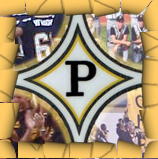Coach Bell's Web Page


World Geography
World Geography
Syllabus
Teacher: Coach Jeff Bell Course: World Geography: 45.0711004
Room: B80 Textbook: McDougal Little, World Geography
E-Mail: jbell@peachschools.org Taught: First, Second, and Third Block
Phone: (478) 825-8258
Course Objectives
- Demonstrate basic geographic literacy with regard to the major regions, countries, and human and physical features of the world
- Demonstrate an understanding of geographic concepts and processes as they apply to major regions, countries, and cities of the world
- Demonstrate the ability to ask geographic questions
- Demonstrate the ability to apply the appropriate methods and research skills to analyze and solve geographic questions
- Demonstrate an understanding of the principle theories and models used by geographers
- Students will develop an awareness and appreciation of historical, political, economic, and cultural diversity
It is not enough to know something (e.g. a "fact"); you also need to know why that information is important, and when and how we might use that information. You need to be able to apply what you know. It is always more difficult to apply information than just to know it, however, if you do not know how to apply information, then that information just becomes trivia. In this class you will be required to use information for solving problems, analyzing situations, and predicting what places might be like. These include skills at reading, interpreting, and creating maps; skills at reading and interpreting air photos; skills at reading, interpreting, and creating graphs and charts; skills for collecting and interpreting data; and math skills to develop critical thinking skills.
Course Activities
We have 18 weeks to cover a large amount of material. Although I have tried to "assign" an amount of time per area this outline is only a guide. We may spend more or less time depending on classroom ability/progression.
- Map skills: The five themes of geography, the geographer?s tools, skills handbook (1 week)
- Planet Earth: The Earth inside and out, bodies of water, landforms, internal/external forces, seasons, climate regions, the elements of culture, population/political/urban /economic geography (1 week)
- The U.S. and Canada: Landforms and resources, climates, cultural regions, economy, history and government (2 weeks)
- Latin America: Landforms and resources, climates, cultural regions, disasters, economy, history, rain forests, government (1 week)
- Europe: Landforms and resources, climate regions, cultural regions, The European Union, Cleaning up Europe (2 weeks)
- Russia and the Republics: landforms and resources, climate, cultural regions, economic reforms, regional conflicts, history and government (2 weeks)
- Africa: Landforms and resources, climates, cultural regions (East Africa, North Africa, West Africa, Central Africa, Southern Africa), economic development, health care (2 weeks)
- Southwest Asia: Landforms and resources, climates, the Arabian Peninsula, religion, politics, and oil, population, current events (2 weeks)
- South Asia: Landforms and resources, climate and cultural regions, territorial disputes (1 week)
- East Asia: Landforms and resources, climate and cultural regions, trade (1 week)
- Southeast Asia, Oceania and Antarctica: Landforms and resources, climates, comparing cultures, disasters, global environment (1 week)
- World Mapping: (1 week)
- Review/nine week testing: (1 week)
Course Materials
3 ring binder with loose leaf paper (lots of it)
Lead Pencils/Mechanical Pencils (majority of tests are scantron)
Pens (blue or black ink only)
Colored Pencils
12" ruler
Black sharpie marker (fine tip) for map work
Course Procedures
- Students are expected to do always do their best. Doing the best work means that a student must be prepared for class. Remember, You are responsible for your education, which includes asking questions, listening, studying, being on time and seeking help when necessary.
- Appropriate classroom behavior is a necessity including following teacher directions, following class guidelines, and having a respectful character.
- Students are asked to limit the need to leave the room during class period; it interrupts the class and the teacher. Students who limit their use of the hall pass will be rewarded. Students will be given three bathroom/hall passes per nine week grading period. These must be used any time a student leaves the room for any reason. The teacher has the final decision on when and/or if a student can leave the classroom. If a student has used all three passes and still needs to use the hall pass, the student will be assigned 30 minutes of make-up work time to compensate for lost classroom time. This make-up work is due the next school day and immediately upon entering the classroom. Students that do not use their passes can turn them in at the end of each nine week grading period and have three points per pass added to their nine week exam grade (passes cannot be carried over).
Classroom Rules/Discipline
See current student handbook for further information.
Two basic rights and responsibilities exist in this classroom. They are:
- Everyone has a right to be respected.
- No one has the right to interfere with learning.
The following set of rules are derived from these two basic rights and responsibilities.
- Be in your assigned seat before the tardy bell rings. Wandering around the room is not permitted. A school tardy room is assigned to those students who fail to be on time for class. Outside my door is not IN my classroom!
- No talking during presentations. The only person to be talking during presentations of information is the person doing the presenting, whether it is the teacher or a student. Sidebar conversations are inconsiderate. It is distracting to the speaker and to people trying to listen.
- No swearing, teasing, rude comments, rude gestures, or put-downs. No explanation needed, enough said!
- Keep hands, feet, books, and other objects to yourself. Leave other people and their property alone. Throwing ANY object in the classroom is a rule violation.
- Bring materials to class. Class preparation is essential for success throughout the semester including having book, pen or pencil, paper, binder, and any assignments. Students are not expected to waste class time going to lockers or asking for loans of class materials. Do not bring food, drinks, chewing gum, cell phones or personal audio systems to class!
- Discipline. Classroom procedures must be followed. Infractions may result in the following: verbal correction from teacher, teacher detention for thirty-five minutes after school (must be served within a week), teacher student conference after school, teacher calls home, behavior referral to administrator Sleeping in class: Verbal correction by teacher, after school detention for thirty-five minutes (must be served within a week), teacher calls home. Refusing to do work: Verbal correction, behavior referral to administrator. Disrespect to teacher or classmate: Verbal correction, after school detention for thirty-five minutes (must be served within a week), teacher calls home, behavior referral to administrator.
Assignments
- Quality. On all assignments, quality is Job 1. Our goal is to always produce quality work, the kind of work which will be required when you enter the work force as an adult.
- Heading. Use the following heading in the upper right hand corner of your paper:
- Late Work. Late assignments are dealt with in the following manner. Late work is accepted but results in 20 points off for each day late. You will write LATE 1 DAY, LATE 2 DAYS, LATE 3 DAYS, etc on the assignment before you turn it in. Assignments without the number of days late on them will not be accepted and will result in a zero.
- Absences. The student cannot miss over 7 days in the semester in order to receive credit for the class. This includes excused and unexcused classes (see student handbook). It is the student's responsibility to get all work missed when absent. Get to know someone in class, so if you are absent, you can find out what was covered in advance. It is your responsibility to find out what was covered due to an excused absence. Students absent when assignments are due will have one day for each day absent to submit the assignment for full credit. Since exams are scheduled well in advance, exams will be taken immediately upon your return.
First and last name (Example) Peyton Manning
Date Aug 25, 2007
Course World Geography
Block: 1st
Assignment: #1 or Chap 12 Vocabulary
Papers without names will not be graded; instead, they will be discarded at the end of the day.
Cheating
Cheating is a serious offense. I do not expect anyone to cheat. Some examples of cheating are looking at another student's test, talking at any time during a test, cheat notes, falsifying work, tampering with or altering the scantron answer sheet, copying another student's map/questions/vocabulary, etc. If you are caught cheating from another student both you and the other student will receive a zero for the assignment and a phone call home. Saying that you did not know your paper was being copied is not an excuse. Keep your papers covered and in your possession at all times.
Course Evaluation
You earn your grade. It is dependent on your overall points. Grades will be assessed (percentage) on the current student handbook. I believe in utilizing a variety of teaching strategies including cooperative groups, geographical drawing, simulations, individual guided practice, teacher-directed activities, student-centered activities, and technology integrated activities. Major assignments/activities include maps, note-taking, expository writing, computer generated activities, reading text and supplemental materials, projects, homework. Daily work is expected; otherwise you will fall behind quickly. Tests will normally be given at the end of each unit of study. One project will be assigned per nine weeks and will count as a test grade. There will be a comprehensive exam at the end of each nine week grading period. There is not an end of course (EOCT) for World Geography.
Homework
Homework is to be done every night. You need to review your notes and outlines every night, especially when no other work is assigned. Homework should be ready to be turned in at the beginning of class. You will do well in class when you are practicing at home what you are learning in class. Homework can be a reading assignment, complete independence practice started in class, learning vocabulary words, writing a lab report or studying for a test.
Teacher Availability
I am available for tutoring after school with advanced notice between 3:10 and 3:45 except on Fridays.Parent Involvement
I encourage you to be involved with your child's education. I also encourage you to read the student handbook because the handbook provides information concerning discipline and rules enforcement that will be strictly adhered to both, in my classroom and in the rest of the school. Please feel free to contact me as often as necessary. I can be reached through school e-mail or phone.
Success?
You may be asking yourself --what are the keys to success in Coach Bell's class??? Sorry, but it's a lot of the good old fashioned stuff that you have heard before. First, do the readings before the lectures. You will increase comprehension this way. Second, take the time to memorize map locations for the quizzes. This will not only increase your map quiz scores, but if you know where things are then you will have a better understanding of lectures and the textbook. Third, take good notes but do them in your own words. My notes are exactly that, my notes. Notes are intended to remind you of information from the lecture that may not be written down. Putting the lecture information in your own words make it easier for you to recall information when you are studying alone. Fourth, come to class!